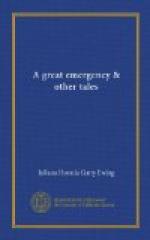Johnson’s father was very proud of him, and let him have anything he liked, and in the midsummer holidays Johnson used to bring his father’s trap and take Rupert out for drives, and Mrs. Johnson used to put meat pies and strawberries in a basket under the seat, so that it was a kind of picnic, for the old horse had belonged to Mr. Bustard, and was a capital one for standing still.
It was partly because of the Johnsons being so kind to Rupert that Johnson Minor and I became chums at school, and partly because the fight had made us friendly, and I had no Rupert now, and was rather jealous of his taking completely to Henrietta, and most of all, I fancy, because Johnson Minor was determined to be friends with me. He was a very odd fellow. There was nothing he liked so much as wonderful stories about people, and I never heard such wonderful stories as he told himself. When we became friends he told me that he had never meant to bully me when he asked about my father; he really did want to hear about his battles and so forth.
But the utmost I could tell him about my father was nothing to the tales he told me about his grandfather, the navy captain.
CHAPTER V.
THE NAVY CAPTAIN—SEVEN PARROTS IN A FUCHSIA TREE—THE HARBOUR LION AND THE SILVER CHAIN—THE LEGLESS GIANTS—DOWN BELOW—JOHNSON’S WHARF.
The Johnsons were very fond of their father, he was such a good, kind man; but I think they would have been glad if he had had a profession instead of being a canal-carrier, and I am sure it pleased them to think that Mrs. Johnson’s father had been a navy captain, and that his portrait—uniform and all—hung over the horsehair sofa in the dining-room, near the window where the yellow roses used to come in.
If I could get the room to myself, I used to kneel on the sofa, on one of the bolsters, and gaze at the faded little picture till I lost my balance on the slippery horsehair from the intensity of my interest in the hero of Johnson Minor’s tales. Every time, I think, I expected to see some change in the expression of the captain’s red face, adapting it better to what, by his grandson’s account, his character must have been. It seemed so odd he should look so wooden after having seen so much.
The captain had been a native of South Devon.
“Raleigh, Drake, my grandfather, and lots of other great sailors were born in Devonshire,” Johnson said. He certainly did brag; but he spoke so slowly and quietly, that it did not sound as like bragging as it would have done if he had talked faster, I think.
The captain had lived at Dartmouth, and of this place Johnson gave me such descriptions, that to this day the name of Dartmouth has a romantic sound in my ears, though I know now that all the marvels were Johnson’s own invention, and barely founded upon the real quaintness of the place, of which he must have heard from his mother. It became the highest object of my ambition to see the captain’s native city. That there must be people—shopkeepers, for instance, and a man to keep the post office—who lived there all along, was a fact that I could not realize sufficiently to envy them.




